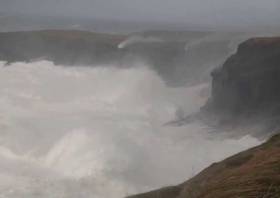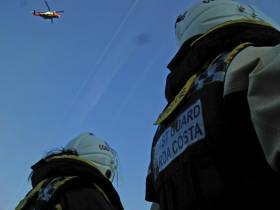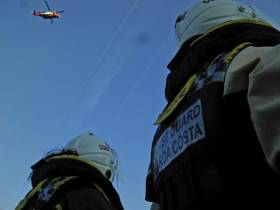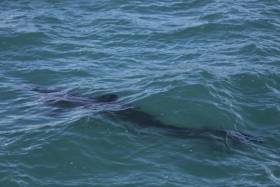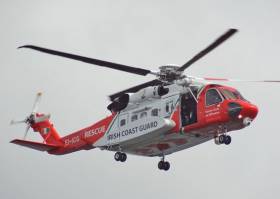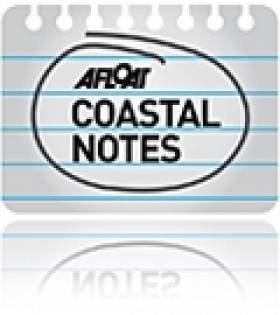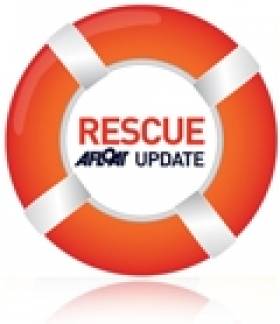Displaying items by tag: Clare
Man Dies After Being Swept Into Sea Near Kilkee
BreakingNews.ie reports that a sea angler has died in an incident on the Co Clare coast yesterday afternoon (Saturday 26 October).
The man, believed to be a Polish national in his 40s, had been fishing with another man at Castle Point near Kilkee when he was hit by an unexpected wave and swept into the sea.
The alarm was quickly raised while the man’s companion attempted to rescue the casualty but to no avail in conditions described as “rough”.
The incident occurred close to where a Hungarian man was swept into the ocean from sea cliffs in January last year.
BreakingNews.ie has more on the story HERE.
Body Recovered In Search For Missing Teacher Off Kilkee
#Kilkee - BreakingNews.ie reports that a body was recovered yesterday (Saturday 24 September) off Kilkee in the search for missing teacher David McMahon.
Hundreds had been involved in the search for the school teacher, who was last seen on 9 September, according to Independent.ie.
The discovery yesterday afternoon came 12 days after the death of Irish Coast Guard volunteer Caitriona Lucas in the same area.
That tragedy occurred when the RIB she and two other coastguard volunteers were on board was flipped over in a heavy swell, three days into the search operation for McMahon off the Co Clare coast.
Woman Swept By Wave Drowns Off Clare Coast
#Drowning - A post-mortem was expected today (Monday 11 July) on the body of a woman who drowned off the Co Clare coast yesterday morning.
RTÉ News reports that the 53-year-old woman from Eastern Europe but living in Co Tipperary was with a fishing group at Ballyreen when a wave swept her into the sea.
She was recovered some time later around 1km from the spot where she was washed in.
Despite best efforts by volunteers and Irish Coast Guard crew to save her, she was pronounced dead after she was flown to University Hospital Galway.
Basking Sharks Spotted In Big Numbers Off Kilkee (video)
#BaskingSharks - Conservationist Andrew Power was in the right place at the right time on Monday morning (11 April) when he witnessed a group of up to 20 basking sharks feeding off Kilkee, Co Clare.
"You could see the inside of their huge mouths very clearly under the water as they were feeding," Power told RTÉ News of the three-hour breakfast. "They swam close to the rocks going in circles. It was incredible."
The Irish Whale and Dolphin Group (IWDG) reports that another sighting was made at the same time off Slea Head in Co Kerry – adding to a list of inshore sightings along the South West coast since 31 March, when the first basking shark spotting of 2016 was reported off West Cork.
Regular visitors to our shores, the second largest fish in the ocean were last seen in numbers back in September, as previously reported on Afloat.ie.
And the sheer size of this group is surely a boost for the 'shark park' initiative mooted for the Wild Atlantic Way last summer.
VIDEO: A close encounter with basking sharks off the Clare coast.https://t.co/d3ozNFg8RI
— RTÉ News (@rtenews) April 12, 2016
Coastguard Airlifts Cliff Fall Casualty On West Cork Coast
#Coastguard - Shannon's Irish Coast Guard helicopter flew to the rescue of a man who survived a 21-metre fall off a sea cliff in West Cork yesterday morning (Monday 7 March).
According to the Irish Examiner, Rescue 115 was tasked along with the Toe Head coastguard unit to attend to the man who was spotted at the base of the steep cliffs at Sandy Cove near Castletownshend.
Both were on scene within 20 minutes of the arrival of the ambulance service, who treated the casualty before he could be safely winched on board the helicopter for transport to Cork University Hospital, receiving further treatment for hypothermia.
It's thought that conditions on the popular cliff path above were rendered unstable after recent heavy rains.
In other coastguard rescue news, Sligo's Rescue 118 was involved in the medevac of an ill crewman from a fishing boat west of Hags Head in Co Clare.
The foreign national, aged 30, complained of abdominal pains before he was flown from the trawler Arkh Angel to University Hospital Galway for treatment, as Galway Bay FM reports.
Body Found In Coastal Search For Missing Clare Man
#Missing - Naval Service divers have recovered a body from the sea in the search for a missing Clare man, as The Irish Times reports.
The grim discovery was made yesterday afternoon (Wednesday 28 October) close to where local man Stephen Mungovan is thought to have fallen accidentally from a cliff late on Sunday night.
As previously reported on Afloat.ie, the cross-agency response began on Monday just hours after the last known sighting of the 20-year-old at the rear of his coastal home.
In other news, the Irish kayaker whose body was found on the Isle of Wight last month had stab wounds to his neck and wrist, the inquest into his death has heard.
But according to TheJournal.ie, Hampshire Police are not looking for anyone else in connection with the death of 40-year-old Dr Morgan Savage, originally from Cork, whose remains were found strapped into his canoe on the island's eastern coast on 11 September.
Dr Savage was only officially identified following a weeks-long media appeal by police, after staff at the boat shop where he rented his kayak recalled an Irish accent.
'Excellent' Result for Clare Bathing Areas in EPA report
#clarebeaches – A newly published report by the EPA on Bathing Water Quality around Ireland has found that County Clare's 11 designated bathing areas were adjudged to have "Excellent Water Quality" during 2014.
The marine environment news has been described as "hugely significant and positive news" by Clare County Council in light of the newly introduced EU standards for bathing areas, deemed by the EPA to be almost twice as strict as those applied in previous years.
Bathing waters were classified into four categories, namely 'Poor', 'Sufficient', 'Good' and the newly introduced 'Excellent' category. The classification system is based on the levels of E. Coli and intestinal enterococci detected in the bathing water during the 2014 bathing season.
Clare is one of five Local Authority areas to receive "Excellent" classifications for each of its bathing areas, the others being Dun Laoghaire Rathdown, Kerry, Leitrim and Louth.
Clare's 11 bathing areas are Ballyalla Lake (Ennis), White Strand (Milltown Malbay), Ballycuggeran (Lough Derg), Cappa Pier (Kilrush), Bishopsquarter, White Strand (Doonbeg), Kilkee, Spanish Point, Lahinch, Fanore and Mountshannon (Lough Derg).
"This is a magnificent achievement for County Clare and those who work throughout the year to safeguard our bathing areas from environmental pollution and to ensure that the public can enjoy these locations in the knowledge that they are bathing in clean waters," stated Councillor John Crowe, Cathaoirleach of Clare County Council.
He added: "This clean sweep for Clare is something that all tourism interests in the County should be aware of as we must now promote our quality beaches and other bathing locations, particularly in light of the growing numbers of visitors arriving in Clare during their journey along the Wild Atlantic Way."
"I wish to pay tribute to the Environment Section of Clare County Council and those living and working in the vicinity of Clare's 11 bathing locations for their due diligence and hard work in delivering this result. It's one that benefits our County's reputation and of course, the environment," said Councillor Crowe.
"The Council is delighted that each of the 11 designated bathing areas that it monitors achieved 'Excellent' status. This achievement is notable in light of the considerable disruption caused to many locations during the storms of early 2014, as well as the newly introduced standards for assessing bathing areas which are almost twice as strict as those previously applied. Our goal now is to maintain these high standards throughout 2015," explained Paul Moroney Senior Engineer, Clare County Council:
Commenting on the bathing water quality results, Dr Matthew Crowe, Director of the EPA's Office of Environmental Assessment, said: "Overall, the quality of Ireland's bathing waters continues to be very good and new standards introduced in 2014 provide a much higher level of protection for bathers."
"Disappointingly, seven identified bathing waters have been assessed as being of poor quality. The relevant local authorities and Irish Water have put management plans in place to tackle the main pollution risks at these beaches. The test will be whether or not we see the necessary improvements in water quality at these beaches," added Dr. Crowe.
The summary report 'Bathing Water Quality in Ireland – A Report for the Year 2014' is available to download from www.epa.ie.
Body Discovered In Search For Missing Fisherman Off Clare Coast
#Missing - RTÉ News reports that a body was found yesterday morning (Sunday 19 April) in the search for a missing fisherman off the Clare coast.
The search and rescue operation began in the early hours of yesterday morning after four people working with tractors in the oyster beds at Poulnaserry Bay got into difficulty when the tide came in.
Three of the fishermen were rescued by a local boat. RTÉ News has more on the story HERE.
Picturesque Homes In Clare & Fermanagh Perfect For Anglers
#WaterfrontProperty - Two new properties on the market in Clare and Fermanagh are sure to appeal to keen anglers.
Sugarloaf on Clifden Hill in Co Clare overlooks Lake Inchiquin, described by the Irish Independent as an 'angler's paradise', and hosting a bounty of wildlife including the spectacular sea eagle.
But the picturesque spot is also a popular area for sunny-day picnics, and not only with the locals.
Sugarloaf provides a permanent picnic spot in the heart of that beautiful visa, with a detached three-bed home in 1.5 acres of gardens with panoramic views of the lake nearby and the Burren beyond.
And in spite of its privacy, with no neighbours in sight, you're just 3.5km from the village of Corofin and a swift drive further on to Ennis.
The Irish Independent has more on this property, on the market for €315,000.
North of the border, angling enthusiasts might be tempted by Amled's Fishing Lodge in Garrison, Co Fermanagh.
Within walking distance of Lough Melvin, the spacious detached five-bed home is on a secure site with high fencing, and plenty of room for boats and more in the driveway.
The wooded grounds have also been developed by the previous owner for wheelchair use, making garden maintenance easier than usual.
It's an unfinished renovation project - the upstairs is yet to be completed - but it'll be more than worth the effort to many, especially with an asking price of just £115,000 (€159,000). 4NI has more on this property.
Elsewhere, for those who just want to enjoy that seaside vibe, the Irish Independent sings the praises of Salthill in Galway.
Just a short walk from the centre of the City of the Tribes, the charming suburb maintains its own old-school seaside town atmosphere, with plenty of local social options, especially for dining.
And of course there's the renowned promenade, which hosts among others the annual An Tóstal race for Galway Hookers.
Champion Bodyboarder Airlifted From Clare Coastal Cliff
#Rescue - A world champion bodyboarder was airlifted to hospital from the base of a Doonbeg cliff earlier this week after suffering an injury in the water off the Clare coast.
The Clare Herald has more on the incident, telling how 36-year-old Australian bodyboard pro Ben Player was injured while bodyboarding near Spanish Point, then fell ill later in the day while watching friends surfing near Doonbeg.
Members of the Irish Tow Surf Rescue Club, who were in the area to keep watch for surfers taking on the challenging Riley's wave, rushed to Player's aid and raised the alarm.
It comes just says after a surfer was rescued from the base of the Cliffs of Moher.
As previously reported on Afloat.ie, the man was winched to safety by the Sligo coastguard helicopter after getting separated from a group of surfers and winding up on the rocks at the foot of the famous Co Clare cliffs.



























